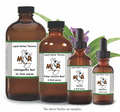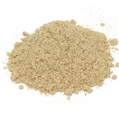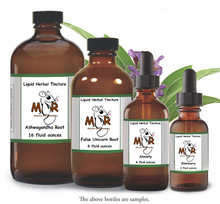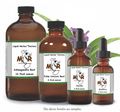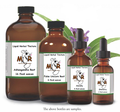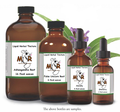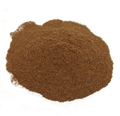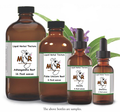 Loading... Please wait...
Loading... Please wait...- Home
- Herbal Tinctures
- Herbal Tinctures - Single Herbs
- Pygeum Bark Tincture
Product Description
Pygeum Bark Herbal Tincture
Overview - Pygeum herb is derived from the bark of the special evergreen tree called Prunus africana that grows in mountainous regions of Sub-Saharan Africa. The herb might’ve been known among natives of southern Africa–having used it to support the bladder and urinary tract–as early as the 1700s. The botanical term Pygeum, of Greek origin, means “buttock,” mostly because of the rounded shape of the fruit. Researchers have discovered a few key phytochemical constituents (phytosterols, triterpenes, and ferulic esters, just to name a few) inherent to Pygeum that are believed to produce the majority of its therapeutic benefits.
This incredible, ancient herb may reduce swelling and provide protection to the body via its high concentration of antioxidants. Pygeum extracts have been used therapeutically since the 1960s in Europe and North America for various prostate issues, particularly benign prostate hyperplasia (BPH) and prostate cancer. Although Pygeum plants bear fruit, the bitterness deters most animals away from consuming it.
Made with Pygeum Bark and Certified Grain Alcohol. 1:3 Ratio
Pygeum Bark and How It Benefits Prostate Health
An extensive analysis of Pygeum bark published in the 2002 Cochrane Database Systematic Review looked at 18 double-blinded, randomized, placebo-controlled trials that were conducted with over 1,500 male study participants with benign prostatic hyperplasia (BPH). Researchers assessed the results of the studies based on urological symptom scales, nocturia (night urination), and urodynamic measurements (peak/mean urine flow and prostate size). Patients supplemented with Pygeum experienced a moderately large improvement (more than double) of overall symptoms as compared to the placebo groups, with little to no side effects noted. [3]
An efficacy/safety study of Pygeum extract intervention in 50-75 year old men with BPH was published in a 1998 issue of Current Medical Research & Opinion. The purpose of the 2-month study was to assess if any improvements in multiple urinary symptoms and quality of life (QOL) were gained. Participants were assessed immediately after the study and again one month post study. Even after ceasing Pygeum supplementation, participants were found to have maintained all the benefits of the prior Pygeum intake. [4]
Another double-blind, placebo-controlled clinical trial was conducted to investigate the benefit of an herbal supplement containing Pygeum extract (among others) on subjects with BPH. Overall symptom scores were reduced by an impressive 36% in the Pygeum supplemented group compared to just 8% reduction in the placebo group. Daytime urinary frequency was reduced 16% in the Pygeum group compared to no reduction in the placebo group. Meanwhile, nocturia was reduced an astonishing 39% in the Pygeum group compared to just 7% in the placebo group. [5]
Prostate Cancer
Two investigational studies by the same lead researcher set out to isolate and determine potential therapeutic compounds and mechanisms of action of Pygeum africanum herb on prostate maladies such as prostatitis, BPH, and prostate cancer. Researchers discovered that a compound inherent in Pygeum called atraric acid imparted therapeutic properties in relation to prostate diseases. Atraric acid was found to inhibit transport of androgen signals that induce cell growth in the prostate, thereby reducing prostate growth.
This mode of action may also target prostate cancer cells, specifically both LNCaP (androgen dependent) and C42 (androgen independent) cells. Atraric acid also inhibits expression of the cancerous gene in prostate cells. Another compound called N-butylbenzenesulfonamide (NBBS) was also shown to work via blocking androgenicity thereby inhibiting potential harmful effects. Additionally, Pygeum extract has been shown to promote apoptosis, or cell death, of prostate cancer cells. While this is by no means the be-all and end-all of prostate cancer solutions, this research does point to a viable link between natural plant compounds and whole body health support. [6] [7] [8] [9]
As can be seen from some of the impressive research studies that have been conducted on Pygeum bark, this revered herbal compound may prove very effective in many future approaches to prostate health. If you’re thinking about taking the bark and similar plant extracts, consult with your doctor to see if the herb is right for you. For full prostate support, it may be helpful to take Pygeum along with other herbs that are known to support prostate health, like saw palmetto, stinging nettle, and turmeric.
— Dr. Edward Group DC, NP, DACBN, DCBCN, DABFM
References:
- Life Extension Foundation. Pygeum. LEF.
- Meschino Health. Pygeum. James Meschino DC, MS, ND.
- Wilt T, Ishani A, et al. Pygeum africanum for benign prostatic hyperplasia. Cochrane Database Syst Rev. 2002;(1):CD001044. PMID: 11869585.
- Breza J, Dzurny O, Borowka A, et al. Efficacy and acceptability of tadenan (Pygeum africanum extract) in the treatment of benign prostatic hyperplasia (BPH): a multicentre trial in central Europe. Curr Med Res Opin. 1998;14(3):12739. PMID: 9787978.
- Coulson S, Rao A, Beck SL et al. A phase II randomised double-blind placebo-controlled clinical trial investigating the efficacy and safety of ProstateEZE Max: a herbal medicine preparation for the management of symptoms of benign prostatic hypertrophy. Complement Ther Med. 2013 Jun;21(3):1729. doi: 10.1016/j.ctim.2013.01.007.
- Papaioannou M, Schleich S, Prade I, et al. The natural compound atraric acid is an antagonist of the human androgen receptor inhibiting cellular invasiveness and prostate cancer cell growth. J Cell Mol Med. 2009 Aug;13(8B):221023. doi: 10.1111/j.15824934.2008.00426.x. PMID: 1862.
- Papaioannou M, Schleich S, Roell D, et al. NBBS isolated from Pygeum africanum bark exhibits androgen antagonistic activity, inhibits AR nuclear translocation and prostate cancer cell growth. Invest New Drugs. 2010 Dec;28(6):72943. doi: 10.1007/s106370099304y. PMID: 19771394.
- Santa María Margalef A, Paciucci Barzanti R, et al. Antimitogenic effect of Pygeum africanum extracts on human prostatic cancer cell lines and explants from benign prostatic hyperplasia. Arch Esp Urol. 2003 May;56(4):36978. PMID: 12830609.
- Shenouda NS, Sakla MS, Newton LG, et al;. Phytosterol Pygeum africanum regulates prostate cancer in vitro and in vivo. Endocrine. 2007 Feb;31(1):7281. PMID: 17709901.
Disclaimer: These products are not intended to diagnose, treat cure or prevent any disease. Reviews are not intended as a substitute for appropriate medical care or the advice of a physician or another medical professional. Actual results may vary among users. Mountain Maus Remedies LLC makes no warranty or representation, expressed or implied, as to the accuracy or validity of the information contributed by outside product review submissions, and assumes no responsibility or liability regarding the use of such information. The information and statements regarding the dietary supplements have not been evaluated by the Food and Drug Administration. If you have a medical condition or disease, please talk to your health care provider. If you are currently taking a prescription medication, you should work with your health care provider before discontinuing any drug or altering any drug regimen, including augmenting your regimen with any herb or dietary supplements. Do not attempt to self-diagnose any disease or ailment based on the reviews and do not use the information contained herein for diagnosing or treating a health problem or disease. Proper medical care is critical to good health. If you have a health concern or suspect you have an undiagnosed sign or symptom, please consult a physician or health care practitioner.







